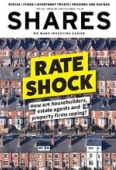Archived article
Please note that tax, investment, pension and ISA rules can change and the information and any views contained in this article may now be inaccurate.
Renewable energy and infrastructure trusts: time for bids and mergers?

It has been a tough few weeks for investors in Ecofin US Renewables (RNEW), with its share price taking a hit from unwelcome news.
A tornado damaged one of its wind farms which accounts for more than a third of its net asset value. Mice eating through cables at one of its solar farms caused further interruptions, and the dividend has been cut in half temporarily.
The problems in this space are not limited to Ecofin. According to figures from the AIC, the renewable energy infrastructure sector for investment trusts has seen an average -10% share price total return over the past 12 months. The broader infrastructure sector is even worse with a 16.6% negative total return.
This situation has attracted the attention of people across the pond, according to chatter among investment experts. It could be the trigger for a new wave of takeovers or mergers in the space.
While Ecofin has company-specific issues, demand for its assets and what they produce remains strong. That is the same situation across the renewables and infrastructure space and it could lead to one of two events.
First, we could see private equity or large infrastructure groups swoop on UK investment trusts given there are examples trading at more than 20% below net asset value. Ecofin US Renewables, for example, trades on a 36% discount and buying the trust would be a straightforward way for another company to snap up a package of assets – potentially paying a decent premium to where the share price currently sits but still getting the assets for less than buying them individually on the market.
Nick Greenwood, manager of the Migo Opportunities Trust, says he owns a stake in Aquila European Renewables (AERI) for this reason. ‘Demand is quite high for solar plants in Iberia and wind farms in Scandinavia – so there is an arbitrage developing there. The shares are on a 22% discount but they own assets other people want.’
If takeovers do not happen then mergers could follow. Eighteen of the 22 trusts in the renewable energy infrastructure sector are worth less than £1 billion, 10 of which below £400 million.
Consolidating the sector to a much smaller number of trusts with greater scale would make them more appealing to wealth managers.
There is little to differentiate what the renewable trusts do and demand has dwindled over the past year. That is because rising interest rates have negatively impacted their valuations and investors can get risk-free returns from gilts and cash at the same 4% to 5% rate as the trusts’ historical dividend yields.
‘Most of the selling we’re seeing with these trusts is institutions getting redemptions (so they need to find assets to sell to raise cash),’ says Greenwood.
The decline in share prices has lifted the average dividend yield in the renewables investment trust sector to 6.6%, according to the AIC. A selection offers 7% to 8% yields and that might be the bare minimum needed to attract investors now that the risk-free rate is 4% to 5%.
It suggests that share prices in this space may not bounce back to levels seen in recent years unless we see M&A. Yet the reasons to see corporate deals are growing by the day, so do not take your eye off this space.
Important information:
These articles are provided by Shares magazine which is published by AJ Bell Media, a part of AJ Bell. Shares is not written by AJ Bell.
Shares is provided for your general information and use and is not a personal recommendation to invest. It is not intended to be relied upon by you in making or not making any investment decisions. The investments referred to in these articles will not be suitable for all investors. If in doubt please seek appropriate independent financial advice.
Investors acting on the information in these articles do so at their own risk and AJ Bell Media and its staff do not accept liability for losses suffered by investors as a result of their investment decisions.
Issue contents
Feature
- The tiny company hoping to make it big after US breakthrough
- Car premiums are rocketing, so why are insurance shares down?
- Why there’s much more to Associated British Foods than Primark
- The UK-listed shares where investors might not be paid the full dividend amount
- Rate shock: How are housebuilders, estate agents and property firms coping?
Great Ideas
News
- Campbell Soup shares go cold as investors are disappointed over earnings progress
- Markets rally across the pond as cooling inflation supports soft landing scenario
- Thames Water: what its crisis means for water utility shares
- The UK stocks which could suffer if Odey Asset Management becomes a forced seller
- FirstGroup shares up 42% this year after string of good news

 magazine
magazine








